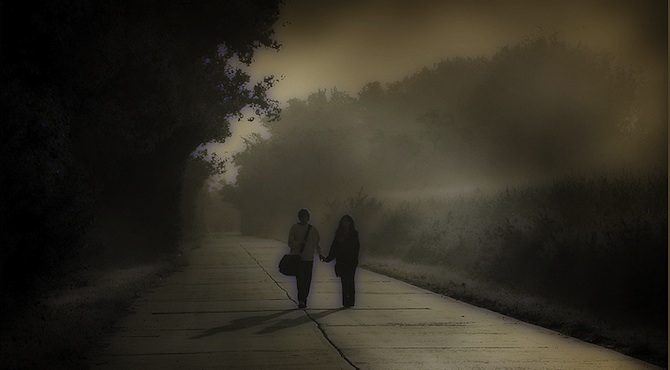By Terence Stone
A friend recently asked me, “If you could give me one piece of advice, one sentence that would sum up the key to a successful relationship, what would it be?”
“Well,” I said, “that is a tall order.” First I told him that I believe “successful” is a completely relative and subjective concept, and in my experience it’s best not to think in those terms. Then I said, “But if I you want one sentence, I suppose I’d say, make the choice to love each other every day.”
Easier said than done, as is all advice when it comes to self-discovery and the volatile bonds between two people, but there it is. Of course, once my friend got me talking, I had to elaborate. Couldn’t help myself.
Moving beyond new love
After a couple has spent a significant amount of time together (usually around the two or three year mark, it seems), the thrill of new love begins to fade. When this occurs, the result is either a shift that leads to ultimate separation, or readjustment to this new, seemingly duller, feeling of love.
Neither of those results is right or wrong, but too often, they are the product of unconscious behavior. For instance, the schism that happened in my relationship (which I’ve spoken about in great depth here) can be traced back to those early years of love.
My wife and I met in the first year of college. We were kids in an exploratory, volatile phase of our lives, and we were in love. We didn’t have the time or emotional know-how to recognize the patterns of behavior that had formed in our relationship by the two-year mark, and thus, many issues went ignored.
The result was a series of very painful events that almost destroyed the relationship in our second year of marriage. You see, we never dealt with the fear, anxiety, and confusion of the shift that inevitably occurred between the new love phase and the more matured love phase. On an unconscious level, we became unsure as to what that shift meant, and how we were suppose to continue loving each other.
Reaching for new depths
Often, the shift is mistaken for falling out of love with the other person, but I believe it is actually a signal that it is time for the love to begin reaching for new depths. Obviously, this can be very frightening, especially if there are things lurking there that we’d rather not expose.
In other words, if falling in love and the new love phase are easy states to maintain that require little consciousness, then moving into a more mature state of love, which is harder to maintain, requires a good deal of consciousness; hence, making the choice to love.
If I were to speak to a newly minted, love-sick couple about choosing to love every day, it probably wouldn’t make much sense to them. They would say, “What do you mean? We made the choice already. Loving her/him every day is not even a question. It just happens.” To which I’d reply, “Fantastic, I hope you’ll always remember that.”
That is one of the reasons new love is so exciting. It’s effortless. It seems completely natural. We are bubbling with joy. Who doesn’t want that? But like everything in life, that state is impermanent, and a solid, healthy relationship requires much effort and intense introspection.
Choosing to love who?
Whether or not it is consciously done, choosing to move into the territory of matured love brings us right up against the darkest, most secretive, and perhaps forgotten or repressed parts of ourselves. That is why it is scary to mature in love, to love deeply. The other person begins to touch those most fragile places within us.
If there is much there that one does not want to face, the results can be anything from an escalation in fighting and other hurtful actions to a slow deadening of the senses and emotional retreat from the other person. Then, a couple is in dangerous territory.
What I’m getting at is that choosing to fully love another person is not just the words, and it is not necessarily about the other person. We must first, and then simultaneously and continually make the choice to love ourselves.
If we compassionately acknowledge, accept, and investigate all the pain that is there, then we begin to truly know ourselves. When we begin to know ourselves, we see a person flawed, yet no less deserving of love and happiness than anyone else.
If we can learn to view ourselves in such a way, then we can learn to view our partners in such a way. We recognize that they, too, have their issues and deserve love. And just as it takes a good deal of effort to learn how to really connect with and accept ourselves, so it will be with the other person. If we can learn to appreciate and treat ourselves with compassion, then we can certainly learn to do the same for our significant others.
In this way, we come into a conscious relationship, and recognize that our partners are not there to fulfill all of our needs, to make us complete, to fill some void. They are there to love and be loved. Then, we both make the choice to walk this often-difficult path together as whole individuals, and to support one another along the way.
Wishing you a depth of compassion and love today.
Photo by Patrick McConahay
If you enjoyed this article and want to get involved, please subscribe to the blog, like us on facebook, and follow us on twitter or Google+.


